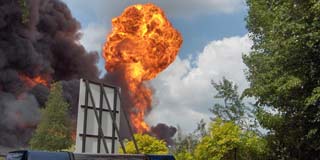HSE claim for costs substantially reduced.

The Judge at Chester Crown Court fined two companies for safety failures following a blaze at the Gateway industrial estate in June 2007. A ‘newton hearing’ was avoided by a novel use of a ‘Joint Experts Meeting’ to reduce costs.
The HSE prosecuted two companies at the outset of the case, maintaining that Pakawaste had designed, manufactured and supplied a machine that created a flammable atmosphere and was unsafe. The unit was being used in the main to shred aerosol cans together with paint tins, drums and similar contianers. Pakawaste pleaded guilty to an offence under section 6(1)(a) of the Health and Safety at Work Act 1974.
The case against Greenway, represented by Jeremy Barnett, instructed by Dan Stowers of Irwin Mitchell, was that they breached their general duties by undertaking adequate risk assesments and were responsible for the spread of fire. Greenway is a recycling company that operated a facility following the grant of a licence by the Environment Agency to operate a recylcing business at the site. Greenway pleaded guilty to an offence under section 2 of the Health and Safety at Work Act 1974.
The HSE made specific allegations about inadequate arrangements for separation/segregation between the process and other flammable materials being held prior to shredding, and a failure to install bunding to contain the flammable liquids within the process area, saying ‘ This meant that the initial fire spread rapidly, ultimately engulfing the whole site. The initial explosion and fire was a local problem or difficulty but escalated and was turned into a major fire and incident as a result of this failure’.
Greenway entered a limited plead in December 2010 accepting the risk assessment failures. They denied all other allegations and claimed that the fire had been allowed to develop due to the late arrival of the Cheshire Fire Service for a number of ‘operational reasons’.
The case was then adjourned for a ‘newton hearing’. A number of highly technical issues were canvassed by two experts instructed by the Defence, and then considered by two experts instructed by the HSE. Despite a full and particularised further basis of plea, the HSE declined to accept the Defence contentions, so the case was listed for a trial of the issues by a Judge alone.
Following a suggestion by the CEO of Greenway, the parties agreed to a joint meeting of experts, a practice normaly reserved for civil proceedings, to see if the issues could be resolved without the need for a lenghtly and costy hearing. This was approved by the Judge and a meeting took place on 20th June 2011. The joint experts report agreed with a number of propositions that had been advanced by Greenway. In a further clarification on 19th July, the joint experts agreed with one concession that bunding might have provided limited mitigation of risk.
The Judge. HH Judge Teage Q.C. then sentenced the Defendants on 28th July. He fined Pakwaste £50,000 and ordered them to pay £87,000 in costs. He fined Greenway £37.500 accepting a number of mitigating points made on behalf of the company, but made a substantial reduction in the costs that had been claimed by the HSE from £135,000 to £50,000 saying that he was not convinced that all the costs were reasonable and indicated that he did not feel that this investigation and prosecution had been ‘focussed on those issues that remain truly relevant‘. The Judge went on to say in sentencing,
‘Otherwise there may develop an unfortunate practice of indiscriminate pursuit of all possible theoretical breaches of duty, without regard to their relative importance in the overall picture.’
Although Greenway incurred costs in contesting allegations that were made by the HSE at the outset of the case, the acceptance by the Judge of the case as set out in the basis of plea resulted in a substantial reduction in fines and costs that would have resulted, had the case been accepted on a full basis.
It is believed that the use of Joint Experts in criminal proceedings was a novel suggestion, and it is hoped that this, and other steps that are taken in mediation of civil disputes can become common place in criminal cases. They have a place where both parties feel that issues need to be ventilated, but can prevent the wasting of costs by the HSE, the Court and the Defendants and their use should therefore be encouraged.
Originally posted 2011-07-31 00:00:00.


